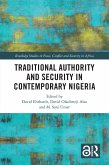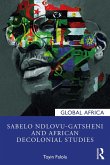Traditional Authority and Security in Contemporary Nigeria (eBook, PDF)
Redaktion: Ehrhardt, David; Umar, M. Sani; Alao, David Oladimeji
0,99 €
0,99 €
inkl. MwSt.
Sofort per Download lieferbar

0 °P sammeln
0,99 €
Als Download kaufen

0,99 €
inkl. MwSt.
Sofort per Download lieferbar

0 °P sammeln
Jetzt verschenken
Alle Infos zum eBook verschenken
0,99 €
inkl. MwSt.
Sofort per Download lieferbar
Alle Infos zum eBook verschenken

0 °P sammeln
Traditional Authority and Security in Contemporary Nigeria (eBook, PDF)
Redaktion: Ehrhardt, David; Umar, M. Sani; Alao, David Oladimeji
- Format: PDF
- Merkliste
- Auf die Merkliste
- Bewerten Bewerten
- Teilen
- Produkt teilen
- Produkterinnerung
- Produkterinnerung

Bitte loggen Sie sich zunächst in Ihr Kundenkonto ein oder registrieren Sie sich bei
bücher.de, um das eBook-Abo tolino select nutzen zu können.
Hier können Sie sich einloggen
Hier können Sie sich einloggen
Sie sind bereits eingeloggt. Klicken Sie auf 2. tolino select Abo, um fortzufahren.

Bitte loggen Sie sich zunächst in Ihr Kundenkonto ein oder registrieren Sie sich bei bücher.de, um das eBook-Abo tolino select nutzen zu können.
Exploring the contentious landscape of Nigeria's escalating violence, this book describes the changing roles of traditional authorities in combatting contemporary security challenges. With in-depth analysis the book will interest researchers and policy makers of African, devlopment and security studies, political science and anthropology.
- Geräte: PC
- ohne Kopierschutz
- eBook Hilfe
- Größe: 18.83MB
Andere Kunden interessierten sich auch für
![Traditional Authority and Security in Contemporary Nigeria (eBook, ePUB) Traditional Authority and Security in Contemporary Nigeria (eBook, ePUB)]() Traditional Authority and Security in Contemporary Nigeria (eBook, ePUB)0,99 €
Traditional Authority and Security in Contemporary Nigeria (eBook, ePUB)0,99 €![Gender, Peace and Security in Africa (eBook, PDF) Gender, Peace and Security in Africa (eBook, PDF)]() Gender, Peace and Security in Africa (eBook, PDF)46,95 €
Gender, Peace and Security in Africa (eBook, PDF)46,95 €![Civil Society and Peacebuilding in Sierra Leone (eBook, PDF) Civil Society and Peacebuilding in Sierra Leone (eBook, PDF)]() Vandy KanyakoCivil Society and Peacebuilding in Sierra Leone (eBook, PDF)41,95 €
Vandy KanyakoCivil Society and Peacebuilding in Sierra Leone (eBook, PDF)41,95 €![Global Africa (eBook, PDF) Global Africa (eBook, PDF)]() Adekeye AdebajoGlobal Africa (eBook, PDF)41,95 €
Adekeye AdebajoGlobal Africa (eBook, PDF)41,95 €![Sabelo Ndlovu-Gatsheni and African Decolonial Studies (eBook, PDF) Sabelo Ndlovu-Gatsheni and African Decolonial Studies (eBook, PDF)]() Toyin FalolaSabelo Ndlovu-Gatsheni and African Decolonial Studies (eBook, PDF)41,95 €
Toyin FalolaSabelo Ndlovu-Gatsheni and African Decolonial Studies (eBook, PDF)41,95 €![Performing Sustainability in West Africa (eBook, PDF) Performing Sustainability in West Africa (eBook, PDF)]() Performing Sustainability in West Africa (eBook, PDF)0,99 €
Performing Sustainability in West Africa (eBook, PDF)0,99 €![Death and the Textile Industry in Nigeria (eBook, PDF) Death and the Textile Industry in Nigeria (eBook, PDF)]() Elisha P RenneDeath and the Textile Industry in Nigeria (eBook, PDF)43,95 €
Elisha P RenneDeath and the Textile Industry in Nigeria (eBook, PDF)43,95 €-
-
-
Exploring the contentious landscape of Nigeria's escalating violence, this book describes the changing roles of traditional authorities in combatting contemporary security challenges. With in-depth analysis the book will interest researchers and policy makers of African, devlopment and security studies, political science and anthropology.
Dieser Download kann aus rechtlichen Gründen nur mit Rechnungsadresse in A, B, BG, CY, CZ, D, DK, EW, E, FIN, F, GR, HR, H, IRL, I, LT, L, LR, M, NL, PL, P, R, S, SLO, SK ausgeliefert werden.
Produktdetails
- Produktdetails
- Verlag: Taylor & Francis
- Seitenzahl: 246
- Erscheinungstermin: 16. November 2023
- Englisch
- ISBN-13: 9781003829966
- Artikelnr.: 69296422
- Verlag: Taylor & Francis
- Seitenzahl: 246
- Erscheinungstermin: 16. November 2023
- Englisch
- ISBN-13: 9781003829966
- Artikelnr.: 69296422
- Herstellerkennzeichnung Die Herstellerinformationen sind derzeit nicht verfügbar.
David Ehrhardt is Associate Professor of International Development at Leiden University, The Netherlands. His main research interests are African governance and educational innovation. David has published extensively on Nigeria and co-leads the Learning Mindset innovation project. He recently co-edited a Special Issue in the Journal of International Development on brokerage, development, and conflict. ORCID ID: 0000-0002-9159-3838 David Oladimeji Alao is a Professor in the Department of Political Science and Public Administration, and Chief of Staff to the President/Vice Chancellor, Babcock University, Ogun State, Nigeria. Prof. Alao has authored several articles and 3 edited books. ORCID ID: 0000-0001-9158-8900 M. Sani Umar is a professor in the Department of History and Diplomatic Studies, University of Abuja, Nigeria. His research centres on religious violence and peace building, with a focus on understanding the roots of religious conflict and the dynamics of religious pluralism.
Introduction 1. Traditional authority, security governance, and Nigerian
agency Part I: Continuity and Change 2. Assessing the capacity of
traditional institutions and authorities in maintaining security and peace:
A historical perspective 3. The changing roles of traditional authorities
in security management: A case-study of the Benin area of Edo State 4.
Female traditional institutions and the travails of conflict management,
peace, and security in Ekiti society 5. The diminishing relevance of
traditional rulers and securitization in the South West 6. The changing
roles of traditional authorities in conflict, security and peacebuilding in
Katagum and Misau Emirate Councils in Bauchi State Part II: Contemporary
Problems and Solutions 7. Importing militant jihadists: Analysing the
response of traditional authorities to Muslim youth extremism in the
Nigeria-Niger border areas of Sokoto State 8. Traditional institutions and
the management of herders-farmers conflicts in Nasarawa State 9.
Traditional rulers and the Amotekun Regional Security Network in the South
West 10. Traditional authority and grassroots' peace-building mechanisms in
Lagos 11. Politicisation of the appointment of traditional rulers and the
challenges of conflict and security management in Umuahia, Abia State
Conclusion 12. Creative genius in postcolonial Nigeria: Re-imagining
traditional rulership at a safe distance from politics
agency Part I: Continuity and Change 2. Assessing the capacity of
traditional institutions and authorities in maintaining security and peace:
A historical perspective 3. The changing roles of traditional authorities
in security management: A case-study of the Benin area of Edo State 4.
Female traditional institutions and the travails of conflict management,
peace, and security in Ekiti society 5. The diminishing relevance of
traditional rulers and securitization in the South West 6. The changing
roles of traditional authorities in conflict, security and peacebuilding in
Katagum and Misau Emirate Councils in Bauchi State Part II: Contemporary
Problems and Solutions 7. Importing militant jihadists: Analysing the
response of traditional authorities to Muslim youth extremism in the
Nigeria-Niger border areas of Sokoto State 8. Traditional institutions and
the management of herders-farmers conflicts in Nasarawa State 9.
Traditional rulers and the Amotekun Regional Security Network in the South
West 10. Traditional authority and grassroots' peace-building mechanisms in
Lagos 11. Politicisation of the appointment of traditional rulers and the
challenges of conflict and security management in Umuahia, Abia State
Conclusion 12. Creative genius in postcolonial Nigeria: Re-imagining
traditional rulership at a safe distance from politics
Introduction 1. Traditional authority, security governance, and Nigerian
agency Part I: Continuity and Change 2. Assessing the capacity of
traditional institutions and authorities in maintaining security and peace:
A historical perspective 3. The changing roles of traditional authorities
in security management: A case-study of the Benin area of Edo State 4.
Female traditional institutions and the travails of conflict management,
peace, and security in Ekiti society 5. The diminishing relevance of
traditional rulers and securitization in the South West 6. The changing
roles of traditional authorities in conflict, security and peacebuilding in
Katagum and Misau Emirate Councils in Bauchi State Part II: Contemporary
Problems and Solutions 7. Importing militant jihadists: Analysing the
response of traditional authorities to Muslim youth extremism in the
Nigeria-Niger border areas of Sokoto State 8. Traditional institutions and
the management of herders-farmers conflicts in Nasarawa State 9.
Traditional rulers and the Amotekun Regional Security Network in the South
West 10. Traditional authority and grassroots' peace-building mechanisms in
Lagos 11. Politicisation of the appointment of traditional rulers and the
challenges of conflict and security management in Umuahia, Abia State
Conclusion 12. Creative genius in postcolonial Nigeria: Re-imagining
traditional rulership at a safe distance from politics
agency Part I: Continuity and Change 2. Assessing the capacity of
traditional institutions and authorities in maintaining security and peace:
A historical perspective 3. The changing roles of traditional authorities
in security management: A case-study of the Benin area of Edo State 4.
Female traditional institutions and the travails of conflict management,
peace, and security in Ekiti society 5. The diminishing relevance of
traditional rulers and securitization in the South West 6. The changing
roles of traditional authorities in conflict, security and peacebuilding in
Katagum and Misau Emirate Councils in Bauchi State Part II: Contemporary
Problems and Solutions 7. Importing militant jihadists: Analysing the
response of traditional authorities to Muslim youth extremism in the
Nigeria-Niger border areas of Sokoto State 8. Traditional institutions and
the management of herders-farmers conflicts in Nasarawa State 9.
Traditional rulers and the Amotekun Regional Security Network in the South
West 10. Traditional authority and grassroots' peace-building mechanisms in
Lagos 11. Politicisation of the appointment of traditional rulers and the
challenges of conflict and security management in Umuahia, Abia State
Conclusion 12. Creative genius in postcolonial Nigeria: Re-imagining
traditional rulership at a safe distance from politics







